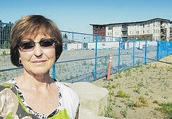Kelly Sinoski
Sun

Connie Blundy looks over the property that is part of a zoning debate in Fort Langley. Photograph by: Wayne Leidenfrost, Vancouver Sun / PNG
While some municipalities like West Vancouver are buying back waterfront for public recreation, Fort Langley residents are fighting to save the community’s last strip of riverfront.
Residents in the Fraser Valley heritage town have come out en masse — packing three nights of public hearings — to oppose a revamped rezoning by ParkLane Homes to build a pair of four-storey condo and townhouse blocks on the river as part of the final phase of the Bedford Landing development.
They argue the 77-unit development is not what the developer promised, and will create “an urban wall” on the river, with little place for the public to play.
“Our thought is we have such a beautiful resource, this riverfront, left and it’s a shame to squander it,” said resident Connie Blundy, who lives in a house on the Bedford Landing development. “Everyone would like there to be a plan for tasteful development recognizing that the fort is a national heritage site.”
Residents say they aren’t opposed to development on the site but are frustrated with council’s decisions to allow ParkLane to change the game plan as it goes along.
The developer had originally proposed to build a 75-unit boutique hotel near Glover Road with a Granville Islandstyle market that would have allowed more public access on the riverfront. It has since revised the project to include adult-only apartments, saying the hotel isn’t feasible.
But Blundy wonders, if council approves the latest rezoning, what will be next. Residents already feel betrayed, she said, after council allowed the developer to increase the size of its first apartment complex at Bedford Landing from three storeys to four. “Those of us [living in Bedford] are somewhat displeased by the look of this four-storey apartment building,” she said.
Residents have made some headway with their fight. Langley Township this week delayed its vote on giving the proposal a third reading, which would have rubber-stamped the project, and instead sent it back to staff to work with the developer on possible alternatives.
Deana Grinnell, ParkLane’s director for land development, said council’s decision will give ParkLane another opportunity to analyze the community’s concerns and see if there are ways to address them.
She noted the development includes a “fair chunk of public realm” — with parkland already designated — but acknowledged the public may not have the same view as the developer as to accessibility.
Council isn’t expected to hear back from staff until September.
“When there’s a delay it’s always a concern but at the same time a reiteration like this results in a better plan,” Grinnell said. “At times this does happen … we’ll see how we can strengthen [the plan].”
Mayor Rick Green said the contentious issue has brought to his attention the need to reconsider reactivating the township’s waterfront development planning process, in conjunction with a review of the area’s Official Community Plan.
While he wouldn’t discuss the ParkLane rezoning as it’s still before council, he said he understands residents’ concerns. “It’s probably one of the most important properties left available in Langley Township, mainly because it’s waterfront,” he said.
Langley Township Coun. Kim Richter agreed. She noted only about 10 per cent of all rezoning applications are contentious, but those are the ones that need extra scrutiny. “There needs to be more consultation with the community over what’s happening with the waterfront,” she said.
“One of the concerns the public raised is if this particular rezoning goes through it’s going to block off a large portion of the waterfront. “
Cheryl MacIntosh of the Fort Langley Canoe Club said her club has no issue with the development as far as their boats go since the developer has improved the boat launch area.
But she worries some future residents might take issue with the noise of local regattas and club meets.
As well, she said, having the backside of an apartment building backing on to the water and the Fort to Fort trail won’t be very inviting to tourists or visitors walking along the water.
“It’s a beautiful waterfront and let’s try to keep it as accessible for everyone we can,” she said, but added: “It is private property.”
Fort Langley‘s battle underscores a continuing struggle in Metro Vancouver as the region grapples with balancing growth and development with public amenities.
West Vancouver, for instance, continues to acquire land for a proposed Ambleside waterfront plan to provide more public use and the “creation of a vibrant and active waterfront.”
It has already initiated a number of projects to boost public access this summer, including an extension of the seawalk from John Lawson Park to 15th and the demolition of one of two publicly owned houses on the waterfront. According to the city’s website it now owns more waterfront land than it ever has.
Meanwhile, Wendy Dadalt, of Metro Vancouver parks, said the regional district is also working with municipalities to acquire waterfront land to provide public trails and green-ways through the different communities.
© Copyright (c) The Vancouver Sun

